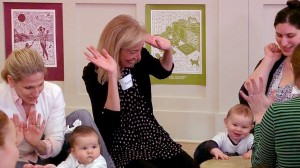When I first started teaching Music Together nearly twenty years ago, I remember trying to explain to my grandmother what my new job was. She seemed to grasp the general concept of a parent-child class that encourages family music-making, where participants learn new songs, play with percussion instruments, and carry on the music at home. But when she realized that I was talking about classes with infants and toddlers, she became clearly puzzled. How on earth do you teach music to a baby?
Well, in truth, you can’t really “teach” music to a baby. But Music Together classes do offer young children the opportunity to absorb and “learn” music in much the same way they learn language. If you think about it, babies are not born with the ability to speak—they are born with the potential to speak. And it is only through prolonged exposure to language and opportunities for experimentation with sound-making that a child will acquire basic competence in language. The same is true for music-learning. When children are given varied and rich music experiences, they will develop what we call Basic Music Competence—the ability to sing in tune and move with accurate rhythm.
It’s particularly important for the parents and caregivers of infants to understand their role in supporting their baby’s music development in the same kinds of ways as they instinctively know how to support language development. When a baby first says “da-da,” a parent or caregiver typically reacts with lots of positive feedback and immediately echoes back “da-da!” This response reinforces the baby’s first attempts at speaking. Over time, through listening to people speak and trying to repeat what they hear (babbling), a baby will become fluent in language.
When a baby first “sings,” however, most parents don’t recognize it as singing—they mistake it for random cooing. And because of this, a baby’s first attempts at singing often occur without any reinforcement from the parent. In Music Together classes, parents and caregivers are taught to recognize and listen for these first attempts at singing, and they are then encouraged to echo those “noises,” whether or not they sound like real “singing.” Just as children naturally acquire fluency in language, they can also become fluent in music-making—naturally!
Through the encouragement and participation of parents and caregivers, even the youngest children can become active music-makers. Music Together classes simply provide the environment and support they need in order to learn.
So, a music class for babies? You betcha!




